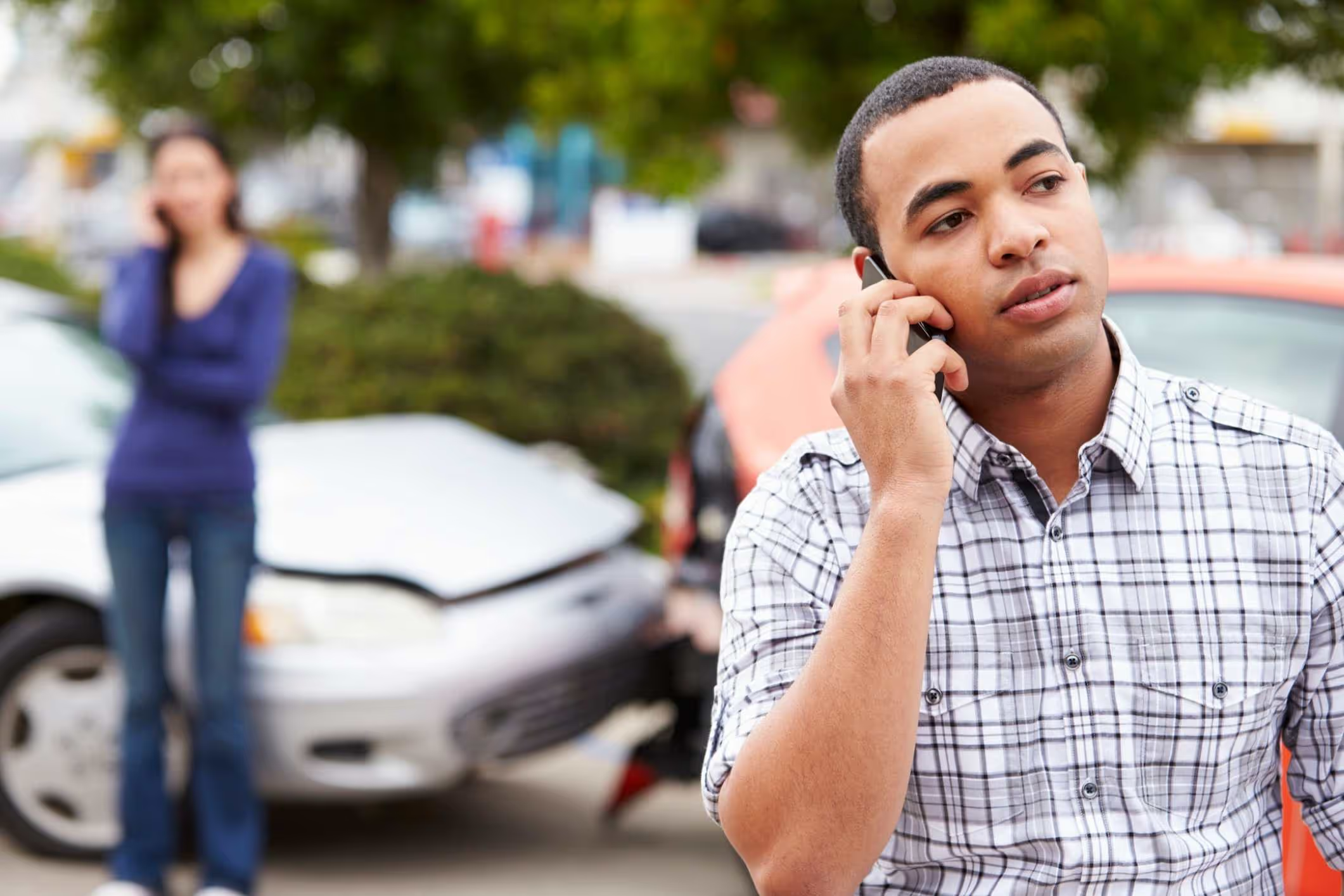You took a road trip across state lines or rented a car while visiting family. Then everything changed in seconds—a car crash in unfamiliar territory. You're far from home, uncertain what rules apply, and wondering what happens if I get in an accident out of state?
You're not alone. Many drivers travel through Florida or leave the state on vacation, for work, or to visit loved ones. A car accident in another state doesn't just ruin the trip; it creates legal and logistical questions most people never plan for.
Here's what to expect and how to protect your rights after an out-of-state crash.
If you were injured in a car accident out of state, you need an experienced car accident lawyer on your side. Osborne, Francis & Pettis is ready to help. Call us at (561) 293-2600 to schedule a free case evaluation.
Do Insurance Policies Work Across State Lines?
Yes. Most car insurance policies automatically extend coverage if you're driving in another state. That includes bodily injury liability, property damage, and uninsured or underinsured motorist coverage.
So whether the accident happened in Georgia, Alabama, or any other state, your Florida insurance policy generally still applies. Many policies even adjust to meet the state's minimum insurance requirements where the crash occurred. That means you won't be penalized just for crossing state lines.
However, not everything follows the same process. Local state laws determine fault, influence compensation, and dictate where you must file your case.
What to Do Immediately After a Car Accident Out of State
The steps after an accident don't change much based on geography. You still need to:
- Call 911 and report the crash to local police.
- Request medical help if anyone is injured.
- Exchange insurance and contact information with the other driver.
- Document the crash area with photos and videos, including vehicle damage, road signs, and traffic signals.
- Avoid admitting fault, even casually, while at the scene.
- Notify your insurance company as soon as possible, but do not consent to giving a recorded statement.
Once you've handled the basics, talk with a car accident attorney. A lawyer can explain how that state's laws affect your rights, what deadlines apply, and whether your case should be handled locally or in Florida.
Can Fault Laws in Another State Hurt Your Claim?
Yes, particularly in states with strict rules about fault. Every state handles fault and liability differently, which can directly influence your case.
For instance:
- Pure contributory negligence states (like Alabama and Maryland) may bar you from recovering anything if you share even 1% of the blame.
- Modified comparative negligence states (like Georgia or Texas) allow compensation only if you're less than 50% at fault, and then they reduce your payout proportionally.
- Pure comparative negligence states (like Florida and California) allow recovery even if you're 99% at fault, though your compensation can be drastically reduced.
If you're from a pure comparative state like Florida but get into a crash in a strict contributory negligence state, your case may be evaluated under a far less forgiving standard.
That's why it matters where the case is filed and why it's essential to work with attorneys who understand each jurisdiction's rules and how they apply when your home state isn't where the crash occurred.
Do You Need a Lawyer in the State Where the Crash Happened?
In many cases, yes. Whether you were injured as a driver, passenger, or pedestrian, your case must usually be brought in the state where the crash occurred. That's because of a legal principle called out-of-state car accident jurisdiction.
Even if you live in Florida, a lawsuit involving an accident in another state must follow that state's laws, and the case may need to be filed in its courts.
That's where Osborne, Francis & Pettis comes in. We handle car accident claims involving Florida residents and coordinate with trusted attorneys nationwide when necessary. We know what questions to ask, which rules apply, and how to avoid unnecessary delays, no matter where the accident occurred.
When multiple states are involved, figuring out where to file your car accident claim can get confusing, and insurers may count on that. Our team understands multi-jurisdiction crash cases. Call (561) 293-2600 or contact us online to learn how we can help.
What If You Were Driving a Rental Car?
Rental car accidents add another layer. You may have purchased additional coverage or rely on your personal policy or credit card benefits.
Here's what you need to know:
- Rental companies usually offer supplemental insurance. If you declined it, your own insurance or the other driver's policy would apply.
- Credit cards may offer secondary coverage if the card was used to book the rental.
- State minimums still apply, meaning your coverage must at least meet the local legal requirements for insurance.
After a rental car crash in another state, contact the rental company and your insurer. Then, talk to an attorney to understand how liability and coverage play out based on where the crash occurred.
What If the Other Driver Lives in Another State?
It's common for out-of-state accidents to involve drivers from multiple states. In those cases, a lawyer will look at:
- Where the crash happened,
- Where each driver lives,
- Which state's courts have jurisdiction, and
- Which insurance companies are involved.
A Florida driver hit by a Georgia driver while traveling in South Carolina may need to deal with three different states and different insurance policies.
Our legal team works to simplify that. Osborne, Francis & Pettis helps clients cut through the confusion, evaluate where to file a claim and push back when insurers try to avoid liability based on state lines.
What If the Crash Involved a Commercial Vehicle?
If your out-of-state accident involved a commercial vehicle, such as a delivery truck, rideshare car, moving van, or fleet vehicle, the legal questions become more complex. Commercial drivers often work for companies based in a different state than where the crash happened, and multiple insurers or corporate policies might be involved.
Here's what matters most in these cases:
- Who owns the vehicle?
If the driver was in a company vehicle, the business may be liable, especially if the driver was on duty at the time of the crash.
- Where is the company based?
A Florida driver hit by a business vehicle from Texas while vacationing in North Carolina may have to deal with three sets of state rules and one or more corporate insurers.
- Was the vehicle properly maintained?
Commercial vehicle claims often raise issues like driver fatigue, failed inspections, improper loading, or negligent maintenance.
Because these claims often involve higher policy limits and additional paperwork, they're more difficult to resolve without legal help. Our team at Osborne, Francis & Pettis has experience investigating these kinds of crash cases and can pursue compensation on your behalf, even when the company is headquartered across the country.
What Can You Recover After a Car Accident in Another State?
The same types of compensation generally apply across states, including:
- Medical bills (past and future),
- Lost income,
- Reduced earning ability,
- Vehicle repairs, and
- Pain and suffering.
What varies is how fault affects the claim and whether there are caps or restrictions on damages. Depending on local statutes, a car accident in another state may fall under tighter or looser rules than Florida's.
That's why it's critical to speak with a law firm that understands the differences and can connect you with trusted attorneys in that state when needed.
Talk to Osborne, Francis & Pettis About an Out-of-State Car Accident
What happens if I get in an accident out of state? You may face questions about insurance, liability, and where to file your claim. That's where we step in.
Osborne, Francis & Pettis has decades of experience helping injured drivers, passengers, and families protect their rights after car accidents in other states. Call (561) 293-2600 or contact us online for a free case review. We'll help you take the right steps after a car accident out of state.

.avif)












.avif)


.svg)




